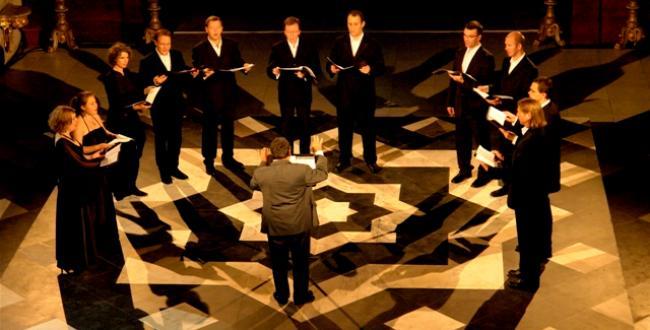Yes it’s Wagner Week at the Proms, and just up the road in the Royal Albert Hall there are dwarves and giants enough to rival Comic Con, and enough noise to silence any objection and obliterate all competition. Even the greatest of musical excess needs a counterbalance, however, and it comes in the form of the Proms’ chamber music events. Saturday’s matinee and yesterday’s lunchtime concerts couldn’t have been in greater contrast to the mighty Ring, offering up two miniature musical portraits.
We started with the Academy of Ancient Music and Richard Egarr, who carried us back to to the early 1700s and Handel’s arrival in Rome – a city that was to shape his music-making so fundamentally. Joining the band was recent Opera Award winner Sophie Bevan, performing two of the cantatas Handel wrote to get around the ban on opera. The results are operas in all but name – concise dramatic scenes whose recitatives and arias take us through short but no less intense emotional dramas.
 Bevan (pictured right) is very much the rising star, and already an assured performer in the opera house. In recital however (and perhaps more obviously here in repertoire that she herself admitted sat rather more in mezzo than soprano territory) she still has an unfinished quality, both vocally and in her presentation. It is entirely charming, and terribly English, but it will be interesting to see how this natural talent develops as it gains the polish that can sometimes almost restrict young Russian or American performers. Cantata “Pensieri notturni di Filli” showcased the lovely warm colours of her lower register, but it was in the slightly higher-lying “Tra le fiamme” with its much fuller orchestra, that she really came into her own. A duet with obbligato viola da gamba was a delight, and the cantata finished in a blaze of assured coloratura fireworks.
Bevan (pictured right) is very much the rising star, and already an assured performer in the opera house. In recital however (and perhaps more obviously here in repertoire that she herself admitted sat rather more in mezzo than soprano territory) she still has an unfinished quality, both vocally and in her presentation. It is entirely charming, and terribly English, but it will be interesting to see how this natural talent develops as it gains the polish that can sometimes almost restrict young Russian or American performers. Cantata “Pensieri notturni di Filli” showcased the lovely warm colours of her lower register, but it was in the slightly higher-lying “Tra le fiamme” with its much fuller orchestra, that she really came into her own. A duet with obbligato viola da gamba was a delight, and the cantata finished in a blaze of assured coloratura fireworks.
Interspersed between the Cantatas were tiny oddities for harpsichord duet by Pasquini, performed here (on a rather extraordinary push-me-pull-you double harpsichord) with characteristic flourish by Egarr and Alastair Ross. These vivid morsels set in relief the more sustained and swooning virtuosics of some of Corelli’s Op. 6 Concerti Grossi, unaccountably getting their first ever outing at the Proms. The Concerto in F major Op. 6 No 12 opens with one of the most glorious suspension sequences of the period, and the Academy of Ancient music gave it their all. It was only outdone for baroque beauty by the encore – the exquisite “Tu del ciel” from Il trinfo del tempo e del disinganno, also from Handel’s Roman period.
 We travelled north and back in time yesterday, moving to 15th- and 16th-century Poland for a programme by Paul Van Nevel (pictured left) and the Huelgas Ensemble. Performed as a continuous musical sequence, a musical portrait of a nation and an age, what was most striking about the concert was the variety of textures and genres on display. We had mature, continental polyphony from Italian-import Luca Marenzio set against simple, strophic hymns from the previous century, all enlivened by Huelgas’s typically eclectic collection of instruments.
We travelled north and back in time yesterday, moving to 15th- and 16th-century Poland for a programme by Paul Van Nevel (pictured left) and the Huelgas Ensemble. Performed as a continuous musical sequence, a musical portrait of a nation and an age, what was most striking about the concert was the variety of textures and genres on display. We had mature, continental polyphony from Italian-import Luca Marenzio set against simple, strophic hymns from the previous century, all enlivened by Huelgas’s typically eclectic collection of instruments.
The Huelgas vocal sound is much thinner and more raw than their English equivalents, and if it takes some getting used to on a purely aesthetic level, in terms of evocative authenticity it really does the job. The anonymous hymn to Krakow’s civic wonders “Cracovia civitas” performed by three solo female voices was barely more than chant, and gorgeous in its simplicity. By contrast Christoph’ Demantius’s sequence of three instrumental dances was generous in its textures and rhythmic details, using a particularly lovely combination of recorders and strings. I found the polyphonic numbers less satisfying, longing for a bit more blend and cover, but Marenzio’s almost madrigalian “Solo e pensoso” suited the group well, getting the most vivid vocal shading of the day, but it was still outdone by the riotous, anything-goes “Tryumfuj, wierny poddany” by Klabon that closed the show. Wagner has the monopoly on so many musical thrills, but where in his entire Ring Cycle will you see a woman simultaneously play a drum and a recorder? Exactly.















Add comment